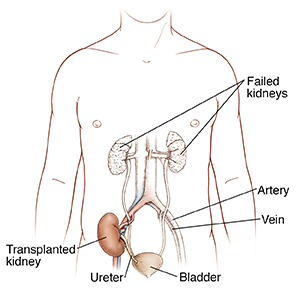Kidney Transplant Information
A kidney transplant is the preferred treatment for kidney failure. It is a surgery to place a donated kidney into your body. This kidney takes over the job of filtering your blood. The transplant is the treatment closest to having your own healthy kidney.
Finding a new kidney
The new kidney may come from:
- A living person (living donor)
- A person who has recently died (deceased donor)
Living donor
This person does not have to be related to you, as long as his or her kidney matches your immune system. A person can safely donate a kidney as long as he or she is in good health and passes all the medical tests.
Living donor kidneys function much longer than deceased donor kidney. For this reason, you are strongly encouraged to discuss this option with your friends and family.
Deceased donor
In these cases, permission is needed from the donor's family. There is a waiting list for kidneys from deceased donors ranging from months to years, depending on your blood type.
Preparing for surgery
You have to undergo a series of tests in the transplant center to make sure that you are eligible for transplantation.
- Tests are done to make sure you don't have any serious infections, such as AIDS or hepatitis B.
- Your vital organs, such as the heart and lungs, need to be working well to withstand the surgery and the anti-rejection medicines.
- A social worker will assess your financial situation and social support.
- Your body's immune system will try to damage the new kidney immediately after the surgery. This is called acute rejection. Taking anti-rejection medicines right after the surgery can prevent this.
- Your healthcare provider will explain your roles and responsibilities with the new kidney. Keeping the kidney working for a long time requires your deep involvement.
- Your healthcare provider will discuss the possible complications of surgery as well as the possible side effects of the post-transplant medicines you will need to take.
- Tests are also done to make sure that the donor kidney matches your body's immune system. This can prevent an acute rejection reaction after the transplantation.
 |
The transplant surgery
- The surgery usually takes about 3 to 6 hours.
- All kidneys are screened for disease before the transplant.
- In most cases, your old kidneys will not be removed. This is because even failed kidneys release chemicals that help your body work.
- The new kidney is placed in the lower part of your belly (abdomen) near your groin.
- The new kidney is attached to nearby blood vessels. Blood can then flow through to be filtered.
- The ureter is connected to your bladder to let urine flow out.
Recovering from surgery
You (and any living donor) will recover in the hospital after surgery. The donor may stay in the hospital for up to a week. You may stay longer. Your new kidney may start to work right away or may take a few weeks. You will be told what to do and what not to do while you’re healing.
After your surgery
You will need to take anti-rejection medicines to keep your body from rejecting your transplanted kidney. These will be needed for the rest of your life. Your healthcare team will discuss possible side effects of these medicines with you. You will need to monitor your health for signs of kidney rejection. These include:
- Less urine output
- Fever
- Pain at the site of your new kidney
Notes to the living donor
Here are some things to know before donating a kidney:
- You can only donate if your blood type is compatible with the recipient's blood type. Other types of matching will also be done. The testing process may require a hospital stay of 24 to 48 hours.
- You will be given a thorough medical checkup to be sure you are healthy enough to donate.
- Your kidney is usually removed by a laparoscopic method, using a few small incisions. In some cases, an open procedure is used. This requires a longer incision. Recovery time is generally longer after an open procedure.
- If you have one kidney removed, the other kidney will take over and keep you healthy. Talk with your healthcare provider about the possible complications of surgery.
- Some of the costs of donating a kidney are covered by the recipient's insurance.
The need for kidneys for transplantation continues to increase, while the number of kidney living and deceased donors has remained constant. If you want to donate a kidney when you die, contact The Human Resources and Services Administration at www.organdonor.gov for more information. Additional information can also be found at the United Network for Organ Sharing at www.transplantliving.org.